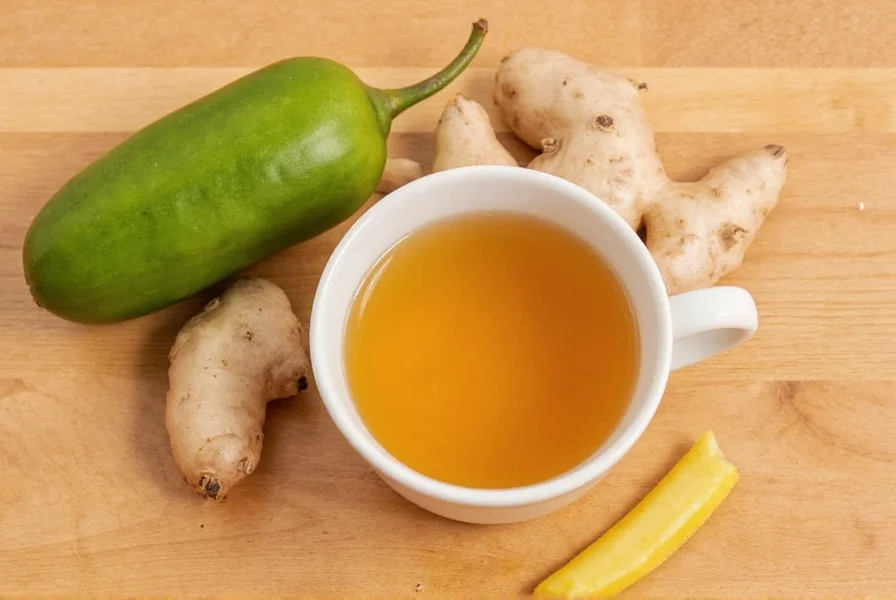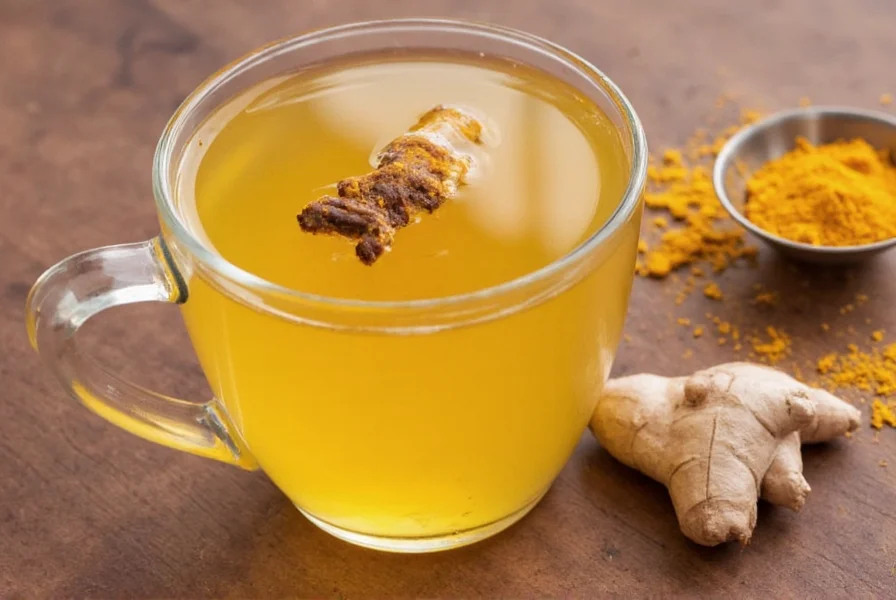Ginger root tea with turmeric has gained popularity as a natural wellness beverage, and for good reason. This ancient herbal combination blends two powerful botanicals with impressive scientific backing. Let's explore what makes this simple tea so beneficial and how to incorporate it effectively into your wellness routine.
Understanding Ginger Root Tea with Turmeric
Ginger root tea with turmeric combines two medicinal plants used for centuries in traditional medicine systems across Asia. Ginger (Zingiber officinale) and turmeric (Curcuma longa) both belong to the Zingiberaceae family but offer distinct yet complementary health properties. When brewed together as a tea, their active compounds create a synergistic effect that enhances their individual benefits.
Science-Backed Health Benefits of Ginger and Turmeric Tea
Multiple clinical studies support the health benefits of this herbal combination. The primary bioactive compounds—gingerol in ginger and curcumin in turmeric—deliver potent therapeutic effects.
Powerful Anti-Inflammatory Properties
Chronic inflammation contributes to numerous health conditions. Research published in the Journal of Medicinal Food demonstrates that both ginger and turmeric significantly reduce inflammatory markers. A 2019 meta-analysis found that ginger supplementation reduced C-reactive protein levels by 17.9% compared to placebo. Turmeric's curcumin works by inhibiting multiple inflammation pathways simultaneously, making ginger turmeric tea for inflammation a valuable natural approach.
Digestive Health Support
Ginger root tea with turmeric stimulates digestive enzymes and improves gut motility. A clinical trial in European Review for Medical and Pharmacological Sciences showed ginger accelerated gastric emptying by 25% in participants with functional dyspepsia. Turmeric's anti-spasmodic properties further support digestive comfort, making this combination particularly effective as ginger turmeric tea recipe for digestion.
Immune System Enhancement
Both ingredients contain compounds that modulate immune function. Ginger's gingerols demonstrate antimicrobial properties against various pathogens, while turmeric enhances immune cell activity. During cold and flu season, many people find regular consumption of ginger root tea with turmeric provides valuable immune support without pharmaceutical intervention.
Antioxidant Protection
The combined antioxidant capacity of ginger and turmeric exceeds either ingredient alone. These compounds neutralize free radicals and boost the body's natural antioxidant defenses. Regular consumption may help protect against oxidative stress-related conditions.
| Benefit | Key Compounds | Scientific Support Level |
|---|---|---|
| Anti-inflammatory | Gingerol, Curcumin | Strong clinical evidence |
| Digestive support | Zingibain, Turmerones | Good clinical evidence |
| Immune enhancement | Gingerols, Curcuminoids | Moderate clinical evidence |
| Antioxidant protection | Multiple polyphenols | Strong laboratory evidence |
How to Make Ginger Root Tea with Turmeric
Creating an effective ginger turmeric tea recipe requires attention to preparation methods that maximize bioactive compound extraction. Here's a simple yet optimized preparation method:
- Peel and thinly slice 1-inch fresh ginger root and ½-inch fresh turmeric root
- Add to 2 cups of filtered water in a small saucepan
- Bring to a gentle boil, then reduce heat and simmer covered for 15 minutes
- Add a pinch of black pepper (enhances curcumin absorption)
- Add a small amount of healthy fat like coconut oil or ghee (improves curcumin bioavailability)
- Strain and optionally add lemon juice or raw honey to taste
For those seeking a more convenient preparation, high-quality powdered forms can work, though fresh roots generally provide superior potency. The best time to drink ginger turmeric tea is 20-30 minutes before meals to support digestion, or in the evening to promote relaxation.

Potential Side Effects and Precautions
While generally safe for most people, side effects of ginger turmeric tea can occur in certain situations:
- May interact with blood-thinning medications (both ingredients have mild anticoagulant properties)
- Ginger may cause heartburn in sensitive individuals
- Turmeric may exacerbate gallbladder issues in some people
- Pregnant women should consult healthcare providers about appropriate consumption levels
People with diabetes should monitor blood sugar levels, as both ingredients may enhance insulin sensitivity. Those scheduled for surgery should discontinue consumption at least two weeks beforehand due to potential bleeding risks.
Maximizing the Benefits of Your Tea
To get the most from your ginger root tea with turmeric, consider these evidence-based tips:
- Always include black pepper (piperine increases curcumin absorption by up to 2,000%)
- Add a small amount of healthy fat to improve absorption of fat-soluble compounds
- Use fresh roots rather than powdered forms when possible for higher potency
- Consume consistently rather than occasionally for cumulative benefits
- Pair with vitamin C-rich foods like lemon to enhance antioxidant effects
Comparing Ginger Turmeric Tea to Other Herbal Remedies
While many herbal teas offer health benefits, ginger root tea with turmeric provides a unique combination of properties. Unlike single-ingredient teas, this pairing creates synergistic effects where the whole exceeds the sum of its parts. Compared to green tea, it offers stronger anti-inflammatory effects. Against chamomile, it provides more digestive support. The scientific evidence for ginger turmeric tea supporting inflammation management is particularly robust compared to many other herbal combinations.

Creating a Sustainable Routine
For lasting benefits, incorporate ginger root tea with turmeric into your daily routine. Many wellness experts recommend consuming it consistently for at least 4-6 weeks to notice significant effects. The best time to drink ginger turmeric tea varies by your goals—morning for immune support, before meals for digestion, or evening for relaxation. Listen to your body and adjust timing based on your personal response.
Frequently Asked Questions
How often should I drink ginger turmeric tea for optimal benefits?
For general wellness, most research suggests consuming ginger turmeric tea once or twice daily. Studies on inflammation markers typically use daily consumption over several weeks. Consistency matters more than quantity—regular daily consumption yields better results than occasional large doses. However, those with specific health conditions should consult healthcare providers for personalized recommendations.
Can I use powdered ginger and turmeric instead of fresh roots?
Yes, powdered forms work but generally contain lower concentrations of active compounds. One teaspoon of powder equals approximately one inch of fresh root. For optimal benefits, choose high-quality, organic powders stored in dark containers to preserve potency. Fresh roots typically provide 20-30% higher concentrations of gingerol and curcumin, but quality powders offer convenience for regular use.
Why add black pepper to ginger turmeric tea?
Black pepper contains piperine, which significantly enhances curcumin absorption. Research shows piperine can increase curcumin bioavailability by up to 2,000%. Without this addition, your body absorbs only about 1% of curcumin. A small pinch (⅛ teaspoon) is sufficient to dramatically improve the effectiveness of your ginger turmeric tea.
How long does it take to notice benefits from ginger turmeric tea?
Most people notice digestive benefits within a few days of regular consumption. For inflammation reduction and immune support, studies typically show measurable changes after 4-6 weeks of consistent daily use. Individual responses vary based on metabolism, health status, and the specific condition being addressed. Patience and consistency yield the best results with this natural remedy.
Can ginger turmeric tea help with weight management?
While not a weight loss solution, ginger turmeric tea may support healthy metabolism. Ginger increases thermogenesis (calorie burning), while turmeric may help regulate fat metabolism. Combined with a healthy diet and exercise, this tea can be part of a comprehensive approach to weight management. However, it works best as a supportive element rather than a primary weight loss strategy.











 浙公网安备
33010002000092号
浙公网安备
33010002000092号 浙B2-20120091-4
浙B2-20120091-4